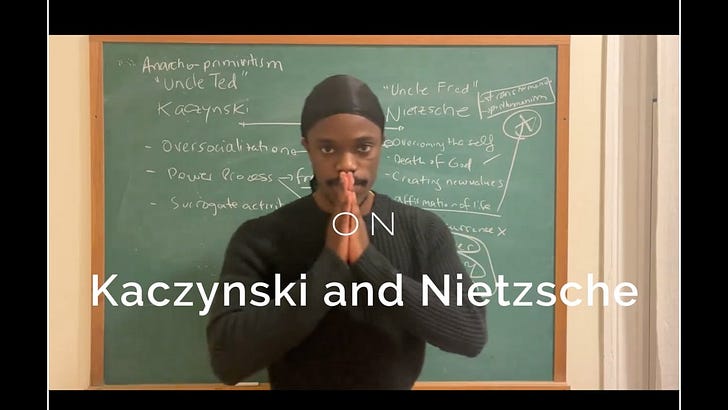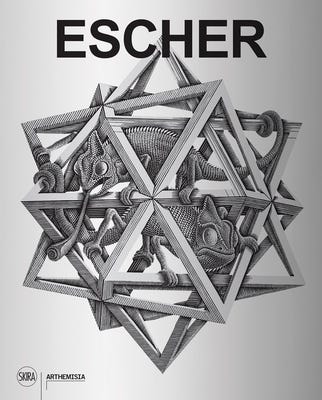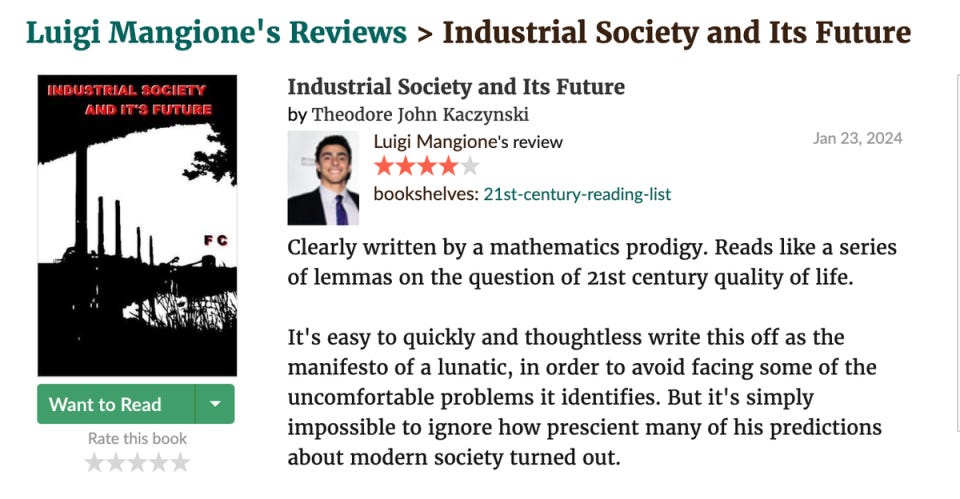E-deologies and Narrative Violations
On Ted Kaczynski, the presumed CEO assassin and Nietzsche's Ubermensch
Earlier this year, sometime around March, a clip of venture capitalist turned political theorist Balaji Srinivasan made the rounds on Twitter. In it, Balaji, the ex-CTO of Coinbase, presented the ideas of German philosopher Friedrich Nietzsche and Ted Kaczynski (the Unabomber) as fundamentally opposed: “techno-optimist” versus “techno-pessimist” and “Accelerationist” versus “Decelerationist”. This was unfortunately a mischaracterization. I recorded a response to the clip which you can view below. The video contains the original clip.
Balaji committed the unfortunate intellectual crime of flattening very complex philosophies into a binary in order to drive a point. An effective rhetoric tool though it falls flat upon further pointed scrutiny. My conclusion, briefly, is that Nietzsche and Kaczynski are not at all opposed, rather their philosophies share similarities. As John Zerzan writes, “Both extolled strength and attacked pity: Nietzsche with his critique of Christianity as an unhealthy ‘slave morality,’ Kaczynski in terms of leftism as a dishonest projection of personal weakness.” I believe this speaks to a bigger issue with binary Manichean thinking, which abounds on the internet. As we burrow deeper into echoey digital rabbit-holes, our ideologies (our e-deologies as Joshua Citarella calls them) become more fringe and more niche, they stop to exist on a simple left to right, pro- and anti- spectrum, awkward Escherian juxtapositions occur, narrative violations emerge.
The most recent narrative violation occurred with the presumed assassin of the United Healthcare CEO who, per internet sleuths, had read and left a positive review of the Unabomber Manifesto, or Industrial Society and its Future. The internet is scrambling trying to peg his motive to a specific side of the ideological aisle, but it is not that simple.
We read the text in class, here is an excerpt from the lecture.
The above clip should be interpreted as a provocation to the students, in order for them to think about where they would place the anti-tech x pro-ecology philosophy espoused by Ted K.
It is important to actually read the text because it’s easy to assume. We see “anti-tech” and “pro-ecology”, and we think "leftist." But perusing the text, you encounter, early on, paragraph 6 of the manifesto which is a clear opposition to leftism and a scathing section entitled “The Psychology of Modern Leftism.” Ted K. actually opposes both leftism and a process he calls "over-socialization," which is the tendency people have in large groups to be influenced and normative. He writes, “Some people are so highly socialized that the attempt to think, feel and act morally imposes a severe burden on them. In order to avoid feelings of guilt, they continually have to deceive themselves about their own motives and find moral explanations for feelings and actions that in reality have a non-moral origin. We use the term “oversocialized” to describe such people.” And, to him, who is responsible for over-socialization? None other than Leftists. Here comes the next narrative violation: Ted K. also opposes conservatives because he sees them as wanting this more traditional, natural way of living but, simultaneously, being in cahoots with the corporations that make this lifestyle impossible.
My main point is that more layered political views based on fringe texts usually do not fit neatly into our current narrow ideological boxes and that these are teeming on the internet. E-deologies is “an internet slang term used to describe complex ideological labels. These hyper-specific categories serve as a gamified form of identity play and niche personal branding in the chaotic landscape of online politics.” Citarella has an extensive research project detailing these extremely online beliefs through flags.
This is a warning for us as we start to see more of these events happen—that our frameworks are no longer applicable. You have tech bros reading Kaczynski, you have leftists reading Peter Thiel, and the fractal combinations that occur will be strange and well outside the realm of what we classically understand to be the left/right dichotomy. It seems like the presumed assassin may be an example of someone with these contradictory digitally-acquired beliefs.
In the lecture, I call Kaczynski’s project a "white settler-colonial fantasy" what I mean is that we need to look at his text as essentially resting on a few assumptions.
The first assumption, of course, is that the state of nature is better than our contemporary state. We can trace that back all the way to Rousseau. We can even trace it back to Eden, probably, where there is an initial state of heavenliness that we are deposed from, that we fall from—"of man's first disobedience," to quote Milton. That longing for a state of nature is very similar to the pastoral and bucolic fantasies of the quest for the New World. This untouched, unmarred, virginal place where a new society can be built. I see this fantastical desire to start anew as germane to the colonial project of the Pilgrims with its great ambitions to break from Europe, its religious persecution, and commence a new society on a new land with their own rules and values. There is a primitivism at play here, something staunchly regressive and thus not progressive. Ted K.’s philosophy is appropriately called "anarcho-primitivism."
“We have it in our power to begin the world over again. A situation, similar to the present, hath not happened since the days of Noah until now. The birthday of a new world is at hand.” - Thomas Paine in “Common Sense” (1776)
The second assumption in the Unabomber Manifesto and in his methods is that this revolution will be brought about not by an organized militia, not by a group of people working together, but rather by a single individual. And so this "anarchism" is fundamentally an individualist anarchism, an anarcho-individualism. This is not the Leftist Communist or Socialist Revolution of all workers rising together. Read the text. He chose not to organize but rather to act as a lone wolf. Lastly, what this dovetails into is his fundamental disdain for groups, as they lead to over-socialization and the creation of "Big Tech," which he describes as technologies requiring infrastructure that cannot be maintained by a single individual or a very small group. He chooses to oppose most forms of socialization in favor of essentially an autarkic and autonomous living, which is fundamentally individualist. This is the Man of the Great Frontier. This is the Lone Cowboy. The American Hero. A decidedly masculine ideal. The world he seeks (the world he lived in, in his cabin) is not a communist no-work utopia, nor is it the traditional family dreamed of by conservatives; it is much closer to 16th-century philosopher Thomas Hobbes’ state of nature, characterized by the “war of every man against every man,” an existence “solitary, poor, nasty, brutish, and short.” It has very little to do with modern urban leftism or rural conservatism, which both rely heavily on community as a pillar, though they may perceive its tenets differently.
Ted K.’s philosophy may be hard to pin down on our contemporary political spectrum as narrative violations abound. The same applies to the presumed assassin, who read both self-help books and the Unabomber Manifesto. Nonetheless, their philosophies in their narrow focus on individual actions and personal agency are staunchly American.







Mangione’s “credentials” (which by American standards are pretty ordinary.) didn’t get him the accolades he felt he deserved. It didn’t set him apart. He was also high. Then the dopamine wore off…. It’s that simple.
What if every ideology necessarily involves false assumptions? There has never been an ideology that succeeded in implementing its vision, because ultimately it is a fantastical relationship to the real totality of our existence. The proliferation of diverse ideologies speaks to the impossibility of representing that totality in narrative form, and thus it is not a question of whether an ideology is true or not, but whether in any particular situation that is the fantastical relationship which best suits it. Ted K is the ideology of the moment because it expresses our nihilistic dissatisfaction with the state of affairs. Nietzsche struggled against nihilism with his ideal of superior types, it was never political. Whereas Ted K’s anarco-primitivism is ultimately an expression of morality which N would have critiqued as the root of its nihilism. The question though is to what degree the Nietzschean anti moral fantasy is appropriate. Maybe we need morality on some fundamental level, it is essential ideology. It really is intolerable how the health care system operates.